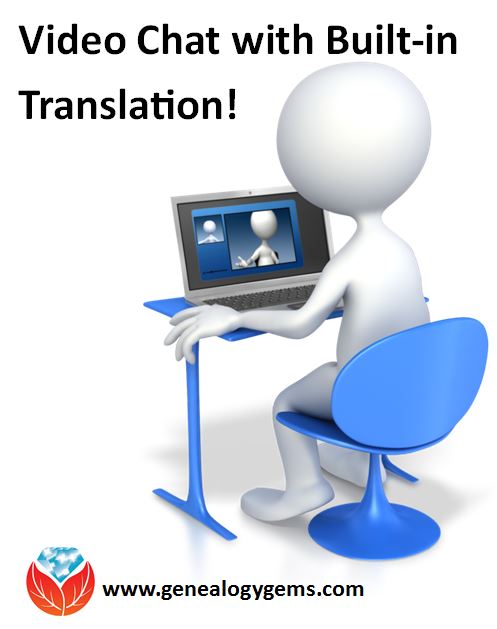Blog


Use Skype Translator to Speak Another Language
 Do you use Skype or another video chat service to keep in touch with loved ones? Have you considered using it for long-distance oral history interviews or collaborating on your genealogy with a faraway cousin? Language barriers can sometimes become a problem. Skype Translator offers a solution!
Do you use Skype or another video chat service to keep in touch with loved ones? Have you considered using it for long-distance oral history interviews or collaborating on your genealogy with a faraway cousin? Language barriers can sometimes become a problem. Skype Translator offers a solution!
Last December, online communications giant Skype announced the debut of Skype Translator. The service launched with two spoken languages, English and Spanish, and more than 40 instant messaging languages. Customers could access it who signed-up via the Skype Translator sign-up page and were using Windows 8.1 on a desktop or device.
The Skype blog has proudly announced that they’ve added Italian and Mandarin to the list of spoken languages in Skype Translator. “As you can imagine, Mandarin is a very challenging language to learn, even for Skype Translator. With approximately 10,000 characters and multiple tones, this is one of the most difficult languages for a native English speaker to master.” The list of instant messaging languages has also expanded.
The post acknowledges years of hard work and testing required for the Mandarin application by Microsoft researchers and scientists in the U.S. and China. “Skype Translator relies on machine learning, which means that the more the technology is used, the smarter it gets,” stated the initial release. “As more people use the Skype Translator preview with these languages, the quality will continually improve.” Here’s a video demonstrating Mandarin translation:
“The focus of our updates in this preview release is to streamline interactions between participants, so you can have a more natural conversation using Skype Translator,” states the recent Skype release. They describe these key updates:
- Text to speech translation:
- You now have the option to hear the instant messages people send to you – in the language of your choice
- Continuous recognition – Recognized text translation as your partner is speaking
- Automatic volume control:
- Your partner can speak while the translation is still happening. You will hear the translation at full volume, and your partner at a lower volume, so that you can follow the translation, which will help make conversations more fluid.
- Mute option for translated voice:
- There is now an option to easily turn the translated audio on or off if you would prefer to only read the transcript.
 Want to learn more about using video chat services like Skype for family history? Click here to read tips about collaborating with other family history researchers via Skype. We’ve blogged about how to use third-party apps to record Skype conversations (click here to learn how). Our free Family History Made Easy podcast features an episode on interviewing skills (episode 2) and a 2-part series on how to contact long-lost relatives (“genealogy cold-calls,” episodes 14 and 15).
Want to learn more about using video chat services like Skype for family history? Click here to read tips about collaborating with other family history researchers via Skype. We’ve blogged about how to use third-party apps to record Skype conversations (click here to learn how). Our free Family History Made Easy podcast features an episode on interviewing skills (episode 2) and a 2-part series on how to contact long-lost relatives (“genealogy cold-calls,” episodes 14 and 15).

DAR Bible Records Now Online

This decorative marriage certificate and the Births page below come from a Sudweeks family Bible I helped return to the Sudweeks family.
The Daughters of the American Revolution Library (DAR) has a free online collection of searchable records. Its Genealogical Research System allows anyone to search databases of ancestors, descendants, members, its Genealogical Research Committee reports and more. Now it’s added another databases: Bible records.
“DAR collections contain thousands of Bible records from the Family Register sections and other pages,” states a news release from Eric Grundset, DAR Library Director. A new database contains “approximately 30,000 Bible records taken from our Genealogical Records Committee Reports. This is an ongoing project as member volunteers review the GRC database to post more materials found in those nearly 20,000 volumes. As time progresses, we will add other Bible listings from other sources in our collections.
“At the present time, if someone wishes to order copies of a specific Bible record, they will need to contact the DAR Library’s Search Services for copies. We are developing the steps for the ordering of pdfs of all of the DAR Bible records for online ordering in the near future. Documentation that is less than 100 years old is restricted for privacy reasons.”
 Family Bibles in years past served as a family’s private vital records registry, where the names, births, marriages and deaths of loved ones were inscribed. A Bible record may be the only place to find some of those, especially for the distant past and for children who died young. But it’s also the most intimate kind of vital record to find, a family’s log of its own kin.
Family Bibles in years past served as a family’s private vital records registry, where the names, births, marriages and deaths of loved ones were inscribed. A Bible record may be the only place to find some of those, especially for the distant past and for children who died young. But it’s also the most intimate kind of vital record to find, a family’s log of its own kin.
Grundset reminds us that “DAR Collections are not limited to the period of the American Revolution or to the families of DAR members.”

We Dig These Gems! New Genealogy Records Online
Every Friday, we blog about new genealogy records online. Do the collections below include your ancestor? Don’t forget: tomorrow is Lisa Louise Cooke’s FREE live streaming class on using Google Tools to Solve Family Mysteries–use them to find more records like these! (Details below.)
This week: Irish newspapers, London electoral registers, Ohio naturalizations and Virginia vital records (through 2014!).
IRISH NEWSPAPERS. Subscribers at FindMyPast can now access over a million new Irish newspaper articles. These eight papers have updates: Cork Examiner, 1841-1896, Derry Journal, 1825-1950; Freeman’s Journal, 1820-1900; Roscommon Journal and Western Impartial Reporter, 1828-1864; Saunder’s News-Letter, 1773-1864; Ulster Gazette, 1844-1871; Waterford Chronicle, 1827-1870 and Waterford Mail, 1824-1870.
LONDON ELECTORAL RECORDS. Nearly 3 million indexed records have been added to the free England, London Electoral Registers, 1847–1913 database at FamilySearch.org. The overall collection contains more than 660,000 digital images of electoral registers filmed at the London Metropolitan Archives.
OHIO NATURALIZATIONS. Over 80,000 indexed names have been added to the US, Ohio, Southern District Naturalization Index, 1852–1991. This database covers a prime migration route: north of the Ohio River (records include courts at Cincinnati, Dayton, Columbus and Steubenville). The index points toward records that can traditionally be tough to find because people could naturalize at any court.
VIRGINIA VITAL RECORDS. Ancestry subscribers can now access these new databases: Virginia, Divorce Records, 1918-2014, Virginia, Death Records, 1912-2014, Virginia, Marriage Records, 1936-2014 and Virginia, Birth Records, 1864-2014. These records–available through 2014–come from the Virginia Department of Health.
 Here’s a tip: Harness Google’s power to search for specific record sets in which your family may appear. Watch Lisa’s free live streaming class TOMORROW, June 6, “Google Tools and Procedures for Solving Family History Mysteries.” Click here for details. Can’t watch tomorrow? You can still register to watch the class in the SCGJ archive through July 5.
Here’s a tip: Harness Google’s power to search for specific record sets in which your family may appear. Watch Lisa’s free live streaming class TOMORROW, June 6, “Google Tools and Procedures for Solving Family History Mysteries.” Click here for details. Can’t watch tomorrow? You can still register to watch the class in the SCGJ archive through July 5.




